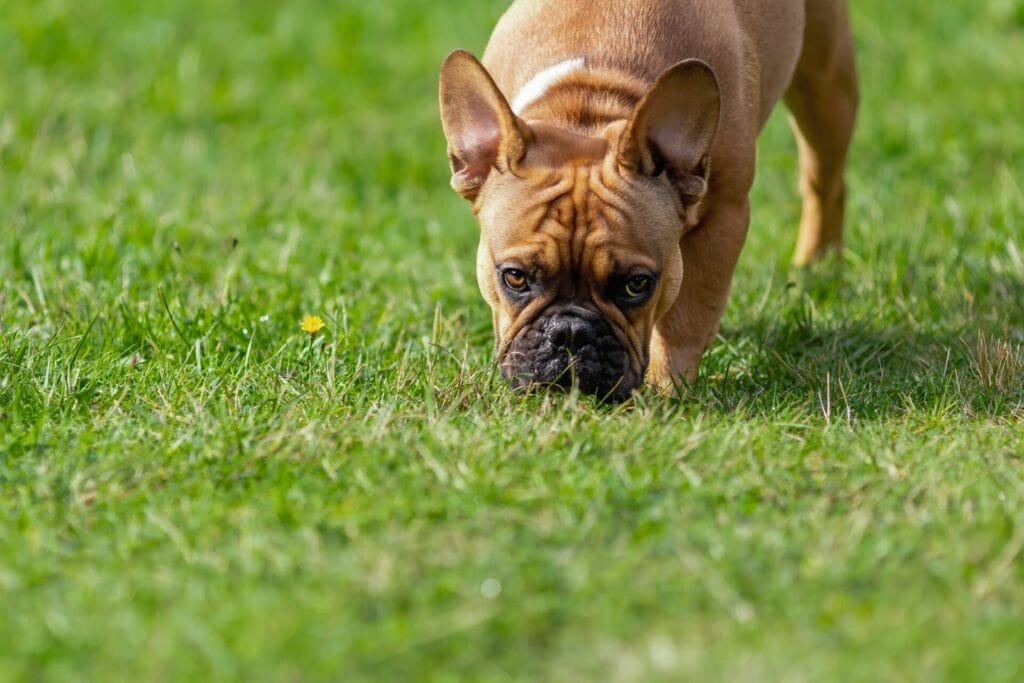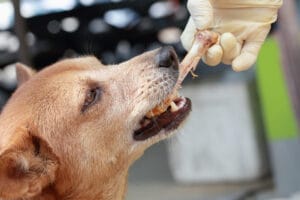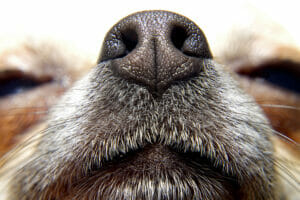Whether you’re outside for potty time or play, you may notice your dog taking a sample of fresh grass around them. But why do dogs eat grass? Does it mean that your dog is sick? The reasons why dogs eat grass are sometimes a mystery. In this article, we will discuss the reasons dogs eat grass, so you can understand this behavior and learn how to politely discourage it.
First, know that you’re not alone in your concern, especially if your dog eats grass and vomits after.
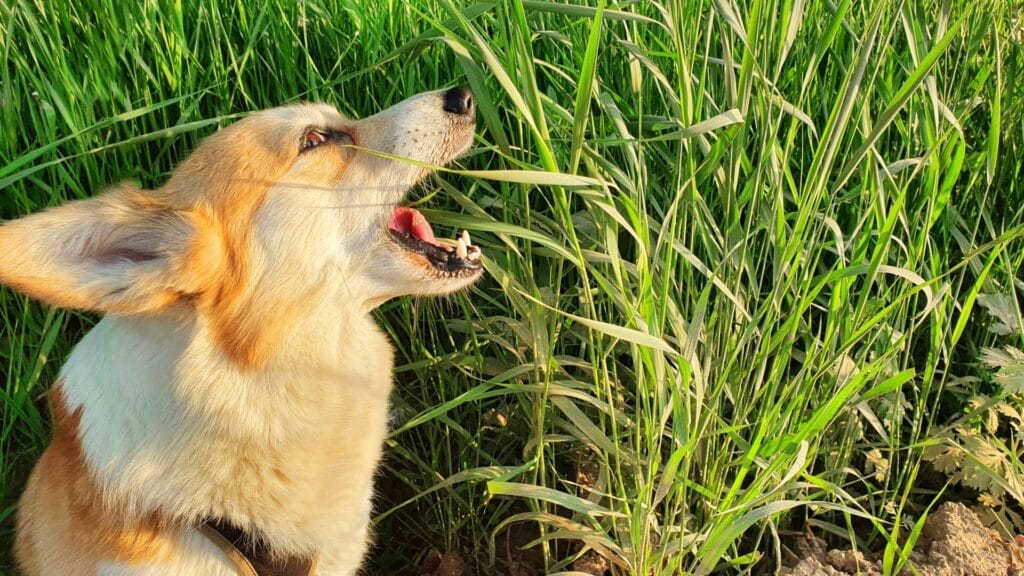
A Few Reasons Why Dogs Eat Grass
Let’s start with the most common belief about why dogs eat grass in the first place. Most commonly, you will hear that dogs eat grass to make themselves vomit or to make their stomach feel better. As far as vomiting, statistically, less than 25% of dogs vomit after they have just ingested grass. Only about 10% of dogs eating grass show signs of illness or discomfort. So, what could it be, then? There are a lot of opinions on the subject, but these are the four most prominent answers you will find to these questions:
1. Your dog eating grass is instinctive behavior.
If a dog’s diet is complete and balanced, eating grass may not be related to a deficiency at all — it might just be instinct. Dogs’ digestive systems, dietary needs, and cravings have evolved to fit the lifestyle of domesticated dogs. Wolves eat grass, and other animals regularly eat grass, but most dogs should not.
While canines in the wild weren’t getting their primary source of nutrients from grass, eating an entire animal provided an optimal diet, especially if it consisted of various plants. Perhaps they naturally crave grass as part of their genetic makeup, dating back to when they hunted their own prey. Wild dogs generally ate grass to add roughage to their diet, to eat more nutrients, and for the taste.
2. Your dog might just need more roughage.
Eating grass could also be your dog’s way of getting more fiber in their diet. This helps them digest their food, pass stool, and keep their GI system and stomach operating like clockwork. Changing to food with a higher fiber content may help your canine eat less grass. Getting enough nutrients for dogs (especially older dogs) can also help eliminate more serious medical problems in the future. All you have to do is add some roughage for a high-fiber diet. They might even like the taste so much more than the food they are eating now. A dog’s stomach can benefit from getting enough fibrous foods.
3. Your dog eating grass could be a potential medical issue.
While a minor amount of grass eating is fairly normal with dogs, excessive grass eating can be a red flag, indicating that your pup may need some special assistance from you and possibly even from the vet. If your dog is showing signs of stomach discomfort after they eat grass, then it could be something more serious such as inflammatory bowel syndrome disease or gastric reflux. If you see signs like these, then you should get your furry friend to the vet for a visit. It is always better to err on the safe side.
One other medical condition that your dog may exhibit is called ‘Pica.’ This is another reason for grass-eating behavior in dogs. Pica is ingesting items that are not food or ‘normal food’. Pica is caused by a nutritional deficiency in dogs. It couldn’t hurt to bring some stool samples to your vet just to be sure. Vets may want to examine the stomach contents, especially if they have had a prior illness.
4. Your dog might just like to eat grass:
If your canine is still trying to eat grass after you have ruled out a potential underlying health issue or a vitamin deficiency, you still might not have a cause to panic. Some animals simply can’t resist chewing on fresh spring grass. It could be part of their normal behavior. So if the grass eating is only on occasion and you notice it looks fresh and shiny green, you don’t have to worry too much.
Just remember to keep them near fresh grass, away from other droppings (which may carry harmful intestinal parasites), and be sure to occasionally reward them with a high-fiber treat to balance their diet. That way, if your dog still wants a little grass, you’ll know that they are at least still getting their vitamins!
Is grass harmful to dogs?
While the grass your dog is eating itself may not be harmful, the herbicides and pesticides sprayed on it can, in fact, be toxic for dogs. Other plants and new grass in your yard can make a dog sick. Also, when plucking the grass from the ground, dogs may ingest intestinal parasites such as hookworms or roundworms that contaminate the grass with fecal residue from other dogs. Many dogs have a grass-eating habit and will not stop eating grass unless humans intervene.
Eating grass is generally considered safe for otherwise healthy dogs and on regular parasite-prevention medication. Pet parents may even find that younger dogs eat grass as a game or to induce vomiting. To keep your grass-grazing dog healthy, ensure there are no herbicides, pesticides, or fertilizers on the grass your doggie nibbles. If they eat grass, just make sure you know what is on the grass itself, or it can cause an upset stomach or worse.
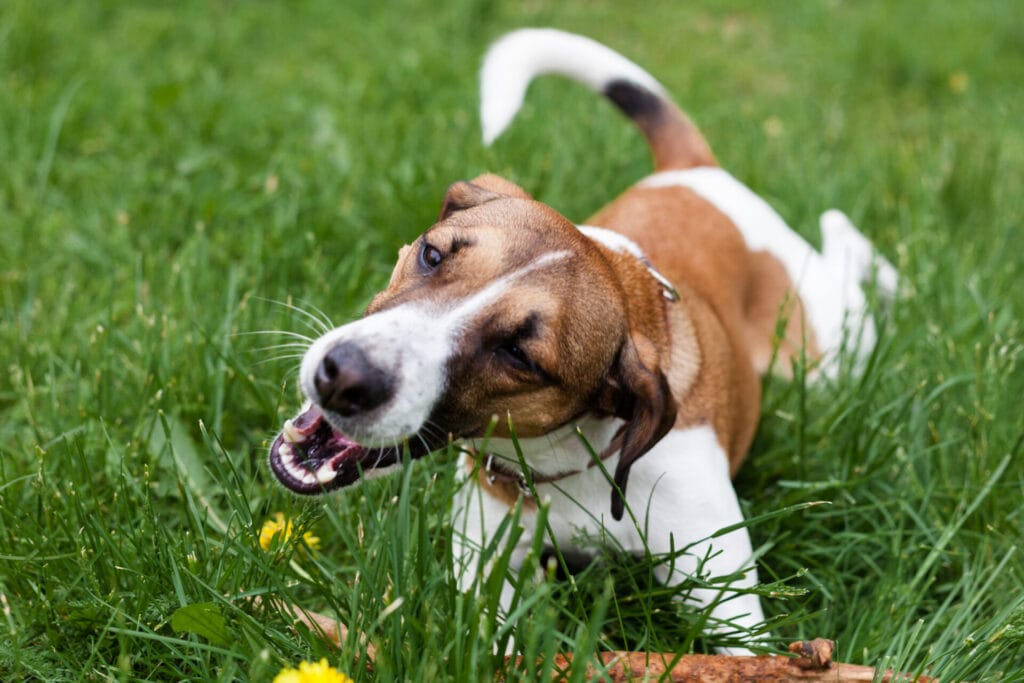
How to Stop Your Dog From Eating Grass
1. “Leave it” command.
If you can, try to prevent dogs from eating grass, especially when it’s not growing on your own property. While chewing on the lawn is a common behavior in many canines, you can train your dog out of the behavior to help provide peace of mind. Teach the “leave it” command and go outside with your dog until you know the habit is broken.
2. Keep your dog away from houseplants.
Always monitor your dog when houseplants are nearby, as certain varieties can cause toxicity if they’re chewed or ingested. It’s best to consult your vet if you think your dog has chewed on a toxic houseplant or possibly ingested too much grass with a few chemicals. Don’t use harmful chemicals or fertilizers – plant a dog-safe garden.
3. Smaller and more frequent meals
Feed your dog smaller, more frequent meals, especially first thing in the morning.
4. Measures to prevent if your dogs eat grass
Consider different pet-safe products or a deterrent spray showing your dog what areas of the yard are off-limits. Be sure non-food items and dangerous hazards are all out of reach.
5. Balanced diet
Ask your veterinarian or a veterinarian nutritionist for recommendations of a balanced, nutritional food or digestive supplement that will best suit your dog’s age, breed, and activity level, especially with more fiber, as mentioned above.
Safe chew toys
When you let your dog in the yard, play with them or give them a safe chew toy to keep them busy. This should distract them enough not to want to chew on grass.
Dogs eat grass as a sign of anxiety.
However, if you believe your dog’s grass eating is due to anxiety or other behavioral issues, the acts of diversion, distraction, and environmental enrichment are recommended, including:
- Increasing your dog’s daily exercise
- Providing plenty of chew toys and distractions.
- Stimulating them mentally with many enrichment activities, like dog puzzles and games.
When to call the vet
If you’ve tried all of the above steps and your dog is still eating grass daily or is eating a lot of grass and then continuously getting sick, having them checked out by a veterinarian to make sure there are no underlying medical conditions is a good idea.
Your vet may recommend changing your dog’s diet to meet their specific nutritional needs or performing a more thorough exam to get to the root of the issue. If your vet believes the issue to be behavioral, they or a board-certified veterinary behaviorist can recommend a specialized treatment plan.
Conclusion
It’s worth noting that occasional grass consumption is generally considered harmless for dogs. However, if your dog eats grass excessively or shows signs of distress after consuming it, it’s advisable to consult a veterinarian. They can evaluate your dog’s health and behavior to determine if any underlying issues or dietary changes need attention.


